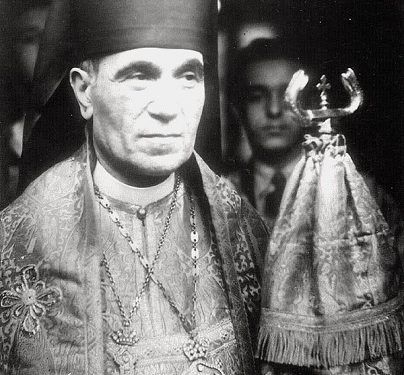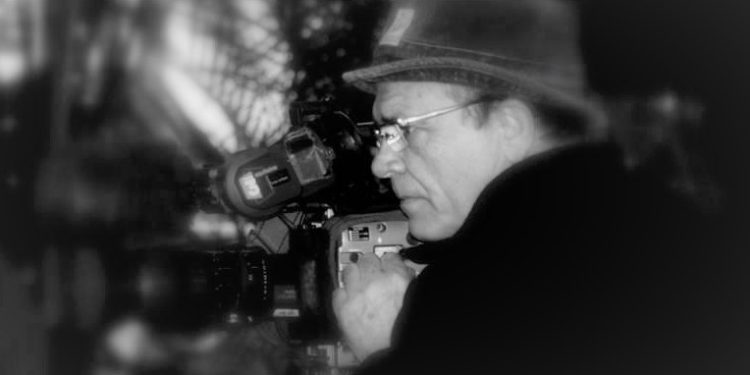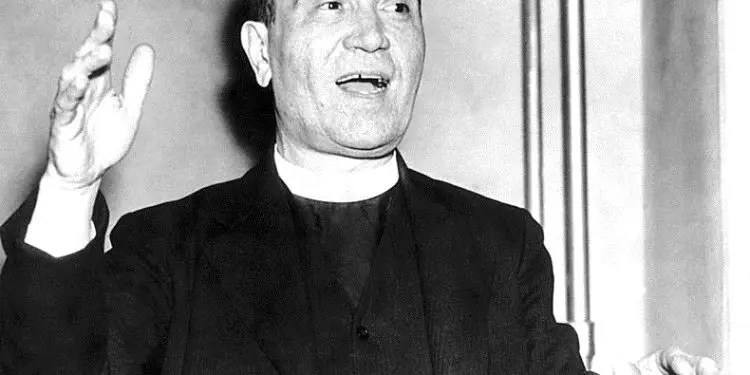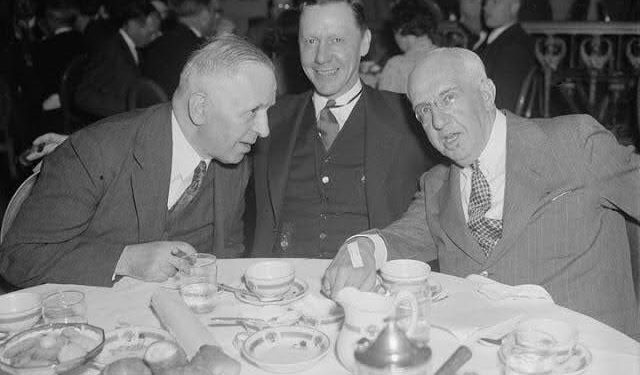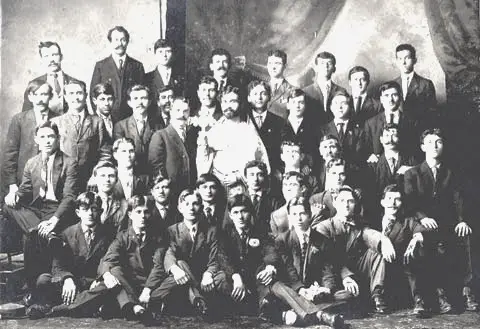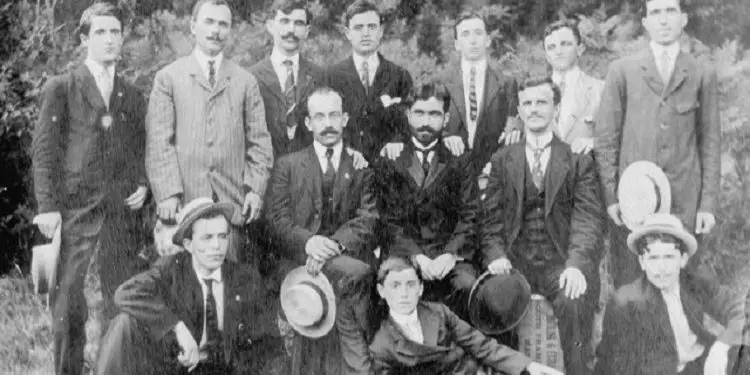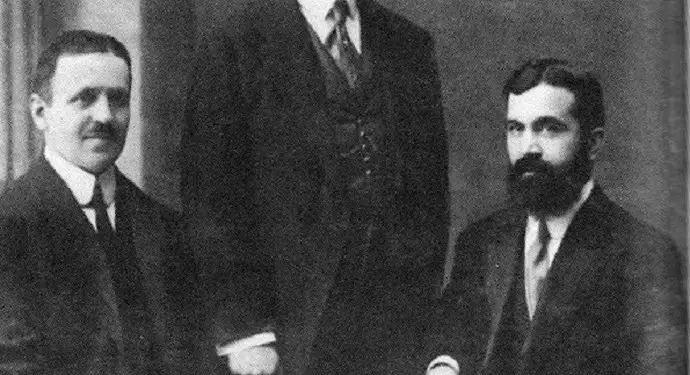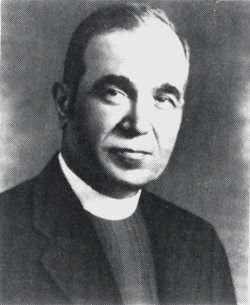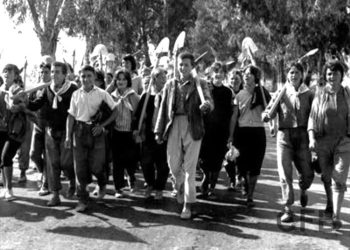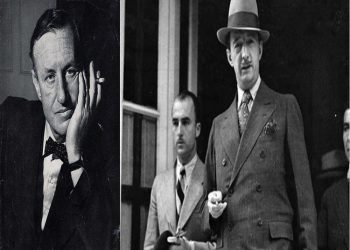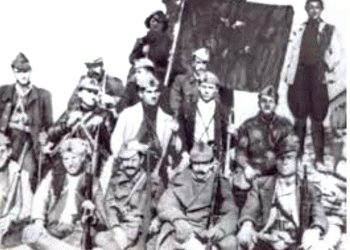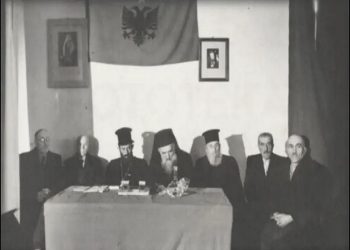By Vasil QESARI
Second part
– Notes about two unknown audio-cassettes with the speech of Fan S. Noli, held on the 80th anniversary of his birth –
Memorie.al / … Last night, until three o’clock in the morning, I was in a state of mind, almost surreal. I sat next to Fan S. Noli. Yes…! Yes! Next to His Grace him, Fan S. Noli! How did it happen?! My friend, the kind and kind Monda Moisiu in the USA, gave me a special surprise recently. He sent me two audio-cassettes, where Fan S. Noli’s speech was recorded on the occasion of the 80th anniversary of his birth, the 50th anniversary of the founding of “Vatra” as well as a press conference given by him, in English. The recording of this ceremony, held in 1962, is an unknown document until now and it is not known under what circumstances and by whom it was made. Its quality is quite pure and has been preserved until our days, by the well-known patriot, the 76-year-old Albanian-American, the honorable Thanas Laskaj.
Continues from last issue
BIKAKJINJI AND KALEMJINJI
or the pacifist Noli…
Now, on this matter, today almost everyone is of one mind: that the problem of every nation is mainly an international problem, with a very small possibility for the people of the country inside. We are all divided when it comes to solving this problem. How will we solve it”?! And Noli, without giving any concrete answer, regarding the destinies of Albania, which languished under communist tyranny, insistently continues his judgement, that at that time, for solving the destinies of nations, there were two solutions, two schools.
That of the “felon”, i.e. of those who believed in solving people’s problems, with the use of sword (violence, war) and the other school, of the “scribe”, of those who thought to solve problems, by means of the kalam (pen, culture, knowledge, science, logic and diplomacy). “So we have war on one side and peace on the other. The solution of the sword is to cut off heads. And he will not sit comfortably until he cuts off the last human head. That solution is given by the sword. If we have another war, no one will be left alive. Thus, there is only one solution left, and that is the peaceful solution”! – concludes Noli, regarding this matter…!
COME ON, TAKE BACK THE HEKALI!
We did not discover Albanian patriotism, but we found it! …I keep listening to the tapes with the words of Fan S. Noli and, I don’t write, I don’t make any comments…! The comment is made by Fan S. Noli himself and sees and read below what a rare comment it is:
“(…) they say that Albanians have had no patriotism. There is nothing more wrong than this! Open Eftim Mitko’s ‘Albanian Bee’, published in 1878, where he collected folk songs, some of which are 18th century, some of the 19th century. I want to tell you, one of these folk poems, which is in the ‘Albanian Bee’, which proves unequivocally that the Albanians had a deep patriotism, before what we call the ‘Modern Albanian Movement’ started, starting from the time of Christopher, in 1875.
The folk poem, which I will recite to you now, was written in 1850, when the Uprising of Labëria took place, during the Tanzimat. Turkey wanted to impose the Tanzimat, a general canon for all the provinces of Turkey. In other words, that even the few governing rights that the Albanians had would be taken away from them and thus the country would be enslaved. The people rose up. The leaders of this movement were Rrapo Hekali, Hodo Nivica and Gjoleka. The song that I will tell you now is the song of Rrapo Hekali. It’s only eleven innings. I will tell you that Faiku reminds me, who always kept it in his mouth and recited it. And then I will analyze it again:
Come on, take Rapo Hekali,
When he calls, how the mountain shakes!
Come on, take Rapo, flower,
Blessed is the whistle that you saw,
A pasha with seven tujes,
The ball is fine; you’re on your way.
Bullets fell on your shoulders,
He was neither scared nor scared.
That Hodo Nivica went,
He crushed the pig’s thigh,
He raised the flag to the crown.
Why do you swear, you fool?
Neither for me nor for you
Yes, for all of Albania!
Open Thimi Mitko’s ‘Albanian Bee’ to find this song, written no later than 1850. Those last three lines show the purpose of that uprising. It was for the whole of Albania. Now I will give you a first analysis, so that you can see that this poem, with these eleven lines, is a true masterpiece, which could have been written by one of the world’s first poets. Look, now, how Rrapo Hekal describes it. In his time, there were no telephones. Even Rrapo Hekali, when he called the laborers to gather to fight, the only phone you had was his voice. Look at how beautifully he describes it:
Come on, take Rapo Hekali,
When he calls, how the mountain shakes!
When he screamed: E, e, e, e, oh friends?! Even the mountain was shaking; all the laborers heard it and they all gathered. The next three rows:
Come on, take Rapo, flower,
Blessed are you, the nightingale that you saw,
A pasha with seven tujes.
So, the pasha that you took, there were seven of you. Yours were exactly like those stars, which the generals of America wear. We have one star general, two star generals, three star generals and four star generals. Above four stars, there are no generals! Also in Turkey, there were stroke with four tujes, but not paschal with seven tujes. Yes, the rhyme, it means what the pasha took. Ay pasha, he was twice as good as the other paschal, that is, the best general of Turkey. Even this was printed by Rrapo Hekali…! Look now, those three verses that come after. What strategy, what tactics did Rrapo Hekali hold, that suppressed this general, Turkey’s first-hand?
The ball, bam, you’re on your way,
Bullets fell on your shoulders,
He was neither scared nor scared.
That is, with simple bravery and no craft, no pure skill. Now, what ignited it, what caused this unbroken rush of Albanians? The verse tells us again in three lines:
That Hodo Nivica went,
He crushed the pig’s thigh,
He raised the flag to the crown.
The pig whose leg Hodo Nivica broke was the Turk. The flag you wore was the flag of the uprising, the flag of freedom. And finally, the purpose for which this whole war took place? Again, again in three lines, the poet says. Great master, you don’t waste many words. Two or three are enough for him:
Why do you swear, you fool?
Neither for me nor for you
Yes, for all of Albania!
… So we did not invent, we did not invent Albanian patriotism, but we found it. The only thing we did is to organize and channel that patriotism that existed among the Albanians. We did just that! Now, the reason why we did well was that we had a people who really loved Albania. A people who, not only had patriotism, the virtue of patriotism, but who also had several other virtues, of which, I will count only one that we have been told by all the foreigners who have visited Albania. When Albania entered the League of Nations, the representative of India, who happened to be a Mohammedan, Muhammad Ali, gave this praise to the Albanians:
Today, he said, we did the most beautiful job, that we joined Albania in the League of Nations. If you study the history of all the nations that have been liberated, you will not find any examples like what we saw today in Albania. Albania is the only country, in which three different religions, whose followers everywhere else fight with each other, have united to create an independent state. This is the only one in the world, in which Mohammedans, Orthodox and Catholics have all joined together to make it an independent state. This country, as far as I know, is the only country that has a Mohammedan majority and sends us here, as a representative, an orthodox bishop.
Many of our people say that Albania was created by a minority. Very true! Yes, this is the history of all the nations of the world. Take, for example, Hindi, with 400 hundred million. Who freed him? Mahatma Gandhi. Also, what did Mahatma Gandhi say when he started his movement?! The first job: I will take it without a weapon, without a war! And he got it. So he won the freedom of Hindi, without weapons. And with how many, you say? He says: It is enough for me to have 25 thousand people as soldiers, who will do exactly as I say. Even if you had that much, you didn’t have more…! And with them he made Hindi! No war. Without double shooting. We did that too. We were few here. We counted on our fingers…”!
“MESELE” TAKEN BY HIS GRACE,
the translator of Omar Khayyam…!
…Even though he did not have deep and strong religious convictions, Noli became a priest in 1908 and it was since then that he began his persistent struggle for the separation of the Albanian Orthodox Church from the Greek Church, holding services Albanian, pronouncing religious books, etc. This thing for that time had political importance because it paved the way for Greek chauvinistic goals, among Albanians with Orthodox Christian faith, and beyond. But precisely, from his words, I, who have read and adored Noli a little, understood once again why he, the author of the perfect translation into Albanian of Omar Khayam’s Rubairs, was basically not really human fanatically devoted to God and that his ecclesiastical activity had primarily national goals.
This is why, on the 80th anniversary of his birth, the founder of the Albanian Orthodox Church would not normally be in the right, nor “protocol”, to allow himself to tell such “messels” as these below. But, this thing did not happen by chance, and the Bishop would laugh with the participants in the hall, with the stories told by him, doing so, so that God, without a doubt, did not see in his person, a humble servant… !
“As a clergyman – Noli confesses – I will start with the tale of a priest. A priest once went with the people to bury the dead in the graves. On the way, near a forest, the priest said: Stay here for a minute, because I have a job! The reason for which he stayed was not understood, and the people were wondering how he left the dead man there. When, after a while, the priest returned from the church with a bifold and said to them: Be quiet! And here is the rifle shot. This is I told you to wait here, he then explained to the people. Aman, oh hurray! Are you leaving the dead man in the middle of the square, so I can kill a rabbit?! – They said. Fools, did the dead man come back? Wait, the rabbit doesn’t wait…”!
Here is another matter, what about the priests, which, as Noli says in his speech, Luigj Gurakuqi told you: “A young priest went to the highlands to say his first mass. Of course, with what his sermon was first, he stayed all night in the desert and wrote it, painted it and made it so that the world would be surprised. Even after he embroidered it, in the end this was his conclusion, the conclusion of the sermon: If you do all this I tell you, you will not go to hell, to hell, but to heaven! That was the end of the speech. Yes, before reaching half of the speech, one of the highlanders stood up and said: Dom Nikola, let’s break the bridge, aman, finish that word, because our candle burned.
(Porlik is meat roasted on a skewer). The desolate priest, when he heard it, was confused and shortened the speech, thus shortening the sermon. And instead of saying, if you do these things, you will not go to hell, but to heaven, he said: If you do these things, I am sure that you will all go to hell, to hell. Well said! – said one of the mountaineers – You are the first priest who tells us the truth…”!
“THE NATION” WAS KEPT ON
from the Holy Fire…!
… Sotir Peci’s “Kombi” newspaper takes me back to my youth with memories. I remember when I used to go to my old friend, Sotir Koçi, to the unforgettable “Bukinisti Mendel” (who died a year ago, at a relatively young age, from a common illness). It was precisely there that I saw for the first time the collections of the newspapers “Drita” (1901-1908), which were published in Sofia, by Shahin Kolonja, as well as “Kombi” by Sotir Peci and “Dielli” by Kosta Çekrezi, in United States. How did those painted collections get to the workshop of “Bookmaker Mendel”?!
This thing was a mystery, something very secret but, apparently, their source had to be the famous library of the Vlonjat erudite, Eqerem Bey Vlora, which was one of the most famous in the Balkans, and, after the liberation, it was treated very badly and it “grew” here and there, over the years. But let’s come back to Noli’s words and to his memories of the newspaper “Kombi”, which was the mother of “Dielli”, the newspaper that enlightened the minds and hearts of Albanians in America for years…!
(… ) “Kombi was founded by Sotir Peci and I was very happy to hear from our friend, Antoni Athanas, who mentioned him. Sotir Peci opened here and started the newspaper ‘Kombi’, in June 1906. A couple of months after that, I sent him a speech that I had given at an Albanian meeting and he published it, then wrote me a letter that if you don’t have any work there, come here so we can try to publish this newspaper, because I need some help. I had a job, but a job I didn’t like, a job in a sawmill. So I left the factory with great joy, and came here to Boston, to do a job which suited me better, according to the purpose I had, to do something for the national cause.
Also, the first mission that Sotir Peci charged me with, sorry, was to go out to the colonies and collect reconciliations. I went to Manchester, collected reconciliation. Then I went to Konker, New Hampshire and there, I did not gather any agreement, that an Albanian was there, and he had paid. Then we went to Til tok, to Penibuk. We didn’t do anything there. Neither had any subscribers, nor did we make any new ones. We entered an inn and found the inn empty. We entered an inn, still empty. But here, there are no Albanians…?! No, wait, there is! – They told us – They are running away, they went to the courtyard, as soon as they heard that we were approaching.
Then we went to Biddiford. I had a very big success there. I collected two reconciliations. Then to Augustamein. There I gathered a reconciliation and finally in Rollandmej, a reconciliation. All of them, it seems to me, were collected, some 24 or 25 dollars, of which more than half went on the way. I brought the change to Sotir Peci and concluded that this: Is it being done, time, work like this? He said. If I told you, what can be done? Neither is done, nor is it to be done! This work of ours has neither beginning nor end…! That’s how we found the Albanian issue then. No organization! There were only one, two or three people, who were taking out some newspapers. We had Shahin Kolonje, who brought “Drita” to the ground with Kristo Luarasi. Kristo Luarasi was very good as a presser. He had a printing press and was a good worker. Good bussinesman, not that the Albanians helped him…!
It was Faiku, who, how did he live? Faiku lived, because he had a very rich uncle, in Sultan Hamit’s palace. Even so, the joke, the grandfather worked for Sultan Hamit and supported Faik, who worked against Dovlet, to create a free Albania. How do you agree, this strange thing? Desolate he, there were no boys, there were only maids. Faiku spent more than he had, even every month, he sent the bill to his uncle. Uncle immediately checked. And so the newspaper was published there. Then the Young Turks came and killed the uncle, and Faik’s work was finished. It’s over! He even came here to America to live with us.
However, after that came Peci. Peci came and started a newspaper, not that he had any support from the people. The work of the Albanians was this: Naum Cerja, tell a very nice joke. They had a meeting and, in that meeting, Faiku and others spoke. Even when the meeting was over, Faik asked Naim Cerjen and said: How did this meeting seem to you? Ore, when you said one word and kh…khh…my tears flow. But why did you miss me? He asked. Yes, I missed you when you said that with Albanians like you, we are sure that the work will be successful. Well, isn’t that true? No, mor – he said – how true?! Albanians, you and I were, both of us – he said. The others were magicians – he said.
It went in one ear and out the other. That’s why I got tears – he said. Well, the beauty is that even though we started with so little ourselves, the work went well. Why? That the few who start it, have the sacred fire, as the French say, “le feu sacré”. They had the fire and managed to have that fire, a small minority. Even the small minority, if there is a field to work in, they finish work. Even the field was, as I told you, that the Albanians were patriots, much earlier, we did not make them patriots. Were. And they were clever and they were brave. They only wanted a leader, and God gave them some leaders for their rebirth, and that’s how things went smoothly”!
MAY THE “SUN” CONTINUE TO SHINE
even without ads…!
“… We started ‘The Nation’ and then, after three years, Sotir Peci left. Here, he said there is no work, I will go to Albania. He also went to the Congress of the Monastery then and then stayed in Albania. Then he went to the School ‘Normale’, as you know at the end, became one of the members of the Regency Council. Anyway, from ‘Kombi’ was born ‘Dielli’. When Sotir Peci left, he left us a printing press here. That printing press was in 100, Hapson Street, in a flat. (…) It was very cold there, we had a stove which didn’t warm us, but only smoked us. How did we press the ‘Sun’? We lined it up ourselves and I’m sorry that we didn’t here is Thimaqi, who was the head typewriter and from whom I also learned the trade of typesetting the press. With that land, we typed it and then, on the machine with which we pressed it ourselves, by foot. America had not progressed that much long ago, when electricity was used in cars.
In short, how did Sotir Peci go, the cars all remained there, as they were, unpaid? Some of the boys who had given the money, the first payment when he bought them, gathered and said: What are we going to do with these? Some said to sell them, some said not to sell them, but to continue the newspaper ourselves. Let’s take out a newspaper. That we could not publish “The Nation” without the permission of the editor. But in order to be able to print a newspaper, we had to pay once for the machines, which were unpaid. So they gathered under the leadership of Kristo Qirka, and then also Misto Millonai, who gathered some of the peasants, Kristo Qirka gathered some of the Korcarians, as well as Dhima and Goni Pitërson, and they paid all this, and they said: Here you have the cars, come on, take out the newspaper!
And that’s how we started “Dielli”, exactly with the same method with which we also launched “Kombi” of Pec. I lined him up with Thimaq and then pressed him on that smoke-choked floor, working with our feet. Yes, we were boys back then, very brave, very fat. This newspaper, started with all that poverty and all that trouble, started on February 15, 1909. On February 5, 1915, it became a daily newspaper. Before, it came out once a week, then twice a week, then three times a week’ and then the daily toast’ when he was the director, the pastry chef, Kostë Çekrezi, who, among other virtues, had the virtue of being a hard worker rarely. Perhaps the greatest worker’ that the Albanian Birth has produced.
Now, you should have one thing in front of your eyes: “The Sun” progressed and managed to become a daily newspaper, and it continued like this for several years. Then its publication became rare, because half, more than half, of the best Albanians we had here, attacked like cattle, like herds and returned to Albania, as soon as the country was opened. And this crippled the national movement here. They went there and remembered that when they returned, they would find the door open again. When they decided to come back here, the door was closed and they couldn’t come. But, nevertheless, with all those troubles, “The Sun” continued. And how did it go on…? You should have this in front of your eyes. “The sun” could not be kept only by reconciliation. If I ask you well, no newspaper in the world is limited to reconciliations.
Contains ads. We also don’t have advertising, of course why, the audience that sings it is very limited and no one advertises without expecting to receive profits from that advertisement. So we should not despair, when we see that from time to time, the “Sun” gets stuck waiting for our help. Now, what can I say about the continuation of “The Sun”? The only thing I can tell them is this. Just like we did this beautiful meeting today, where we gather from all over America and, mature and mature, it would be good to gather every three years, and thus help the ‘Sun’. That there is another purpose, this meeting. We are no longer boys and slowly and slowly, our account is being shortened and closed. So it’s good to ripen every two or three years. Who knows when we will grow up again”! (…)
… I don’t know if, today, the Albanians of America mature as Noli wished and desired, every two or three years. I don’t know if “The Sun” comes out without any obstacles and without the need for “advertisements”. I don’t know if those that Fan S. Noli talks about, those “…very precious, generous friends, who have made plans to ensure the eternity of the ‘Sun’ and the ‘Heart…'”, are still alive and continue to defend her cause and the newspaper in question. But, meanwhile, I know that, after this jubilee meeting, where the last public speech of our great revivalist was held, where he left, so to speak, His Testament, Noli died. He died three years later, there in his modest home, in Fort Lauderdale, Florida, on March 13, 1965…! Memorie.al




